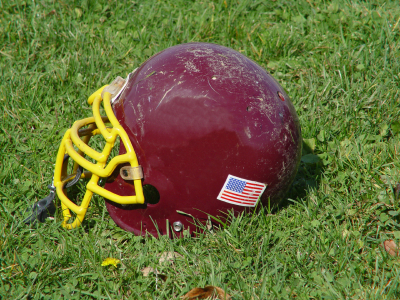OVERLAND PARK, KANSAS - The National Operating Committee on Standards for Athletic Equipment (NOCSAE) board of directors has approved the development of a revised football helmet standard that will require helmets to limit certain concussion causing forces.

The NOCSAE action to move forward the development of a more comprehensive helmet standard was taken on the heels of new NOCSAE-funded research which identified brain tissue response from a concussive event and the development of a new method to test helmets which replicates some of the rotational forces involved in a concussion.
NOCSAE's original football helmet standards, largely unchanged since 1976, have eliminated skull fractures in football. The revised standard will attempt to reduce concussion risk, which, studies show, have thus far largely eluded helmet manufacturers.
"The three directed research projects presented at our winter meeting clarified those issues that the board felt were necessary to move forward with a revised standard," said NOCSAE Executive Director Mike Oliver. "While it is unlikely the concussion risk can ever be eliminated from sports, this revised football helmet standard should bring us closer to effectively addressing some of the forces associated with concussions."
The three research projects were recommended by the NOCSAE Scientific Advisory Committee ("SAC"), chaired by NOCSAE vice-president Dr. Robert Cantu, who has been driving NOCSAE's focus on concussion research since 1996. The SAC recommendations were based on specific science topics the committee felt would be most beneficial to the development of a concussion-specific standard.
"NOCSAE has been focused on sports-related concussions for more than 15 years, and has funded more than $8 million in concussion-specific research since 1996," said Dr. Cantu. "Based upon the research presented at this meeting, as well as all the concussion research that came before, I believe NOCSAE is finally at a point where we can revise our standard to incorporate the science and provide improved protection against concussions."
The revised standard will be considered for approval in June, and if approved, could be implemented as early as September 2015. According to NOCSAE, the revised standard would require football helmets certified to the NOCSAE standard to meet these new requirements. Compliance with current helmet safety standards requires helmets to pass tests involving multiple linear impacts, delivered in varying conditions, locations and strengths. The revised testing method will also evaluate a helmet's performance under a combination of rotational and linear forces associated with concussion-type injuries.
"Concussive and traumatic brain injuries can change or end an athlete's life. This horrible reality in sports has driven us for almost two decades to push science for an answer to sports concussion risk," said Dr. Thomas Gennarelli, Emeritus Professor of Neurosurgery, Medical College of Wisconsin. "That work has reached the point where we now have a scientific basis to address this risk through performance standards specific to concussion risk."
"I am encouraged to see NOCSAE addressing concussions and moving forward with rotational acceleration," said Stefan Duma, a professor at Virginia Tech - Wake Forest University School of Biomedical Engineering and Sciences and a developer of the Virginia Tech Helmet Ratings,TM a test of helmets in a laboratory environment intended to measure their effectiveness in reducing the forces that cause concussion, which NOCSAE has criticized.
[July 17, 2014 update: At its June 2014 meeting in Boston, NOCSAE's Board voted to approve new standards requiring helmets to limit certain concussion-causing forces, both linear and rotational, and open up the proposed standards for public comment until June 2015, at which time, provided there are no revisions, the board is expected to vote to finalize the standard and require implementation by manufacturers by June 2016.]
New research grants awarded
While NOCSAE has made substantial progress in expanding the scientific knowledge regarding sport-related concussions, more work is being done through additional grant funding. NOCSAE has approved two significant grants totaling over $530,000 to two university led two-year research programs, and a third grant is under additional review.
Dr. Margot Putukian, Director of Athletic Medicine at Princeton University, has been awarded a NOCSAE grant to study the effect of head impact biomechanics on short- and long-term neurological status in collegiate men's and women's lacrosse and soccer players. Her study will use a new head motion sensor patch from X2 Biosystems to better understand the forces and frequency of head impacts in lacrosse and soccer and to determine the necessity of additional protective equipment.
Assistant Professor Dr. Kristen Kucera of the University of North Carolina at Chapel Hill and the National Center for Catastrophic Sports Injury Research, earned a NOCSAE grant to expand research aimed at better documenting the epidemiology of catastrophic sport injuries. Her research will expand the current data collection surrounding catastrophic sport injuries by examining actual equipment used by the athlete during one of these events.
NOCSAE is an independent and nonprofit standard-setting body that aims to enhance athletic safety through scientific research and the creation of performance standards for protective equipment. It is the leading nongovernmental source for concussion-specific research funding in sports medicine and science.
"NOCSAE funded and supported research has brought us to a greater understanding of the science behind sport-related concussions, but more work is necessary to make sports safer for athletes. NOCSAE has been committed to concussion research for more than 15 years and will continue making further investments into concussion-related research, with the belief we can continue to improve athlete safety." said Oliver.
Source: NOCSAE








